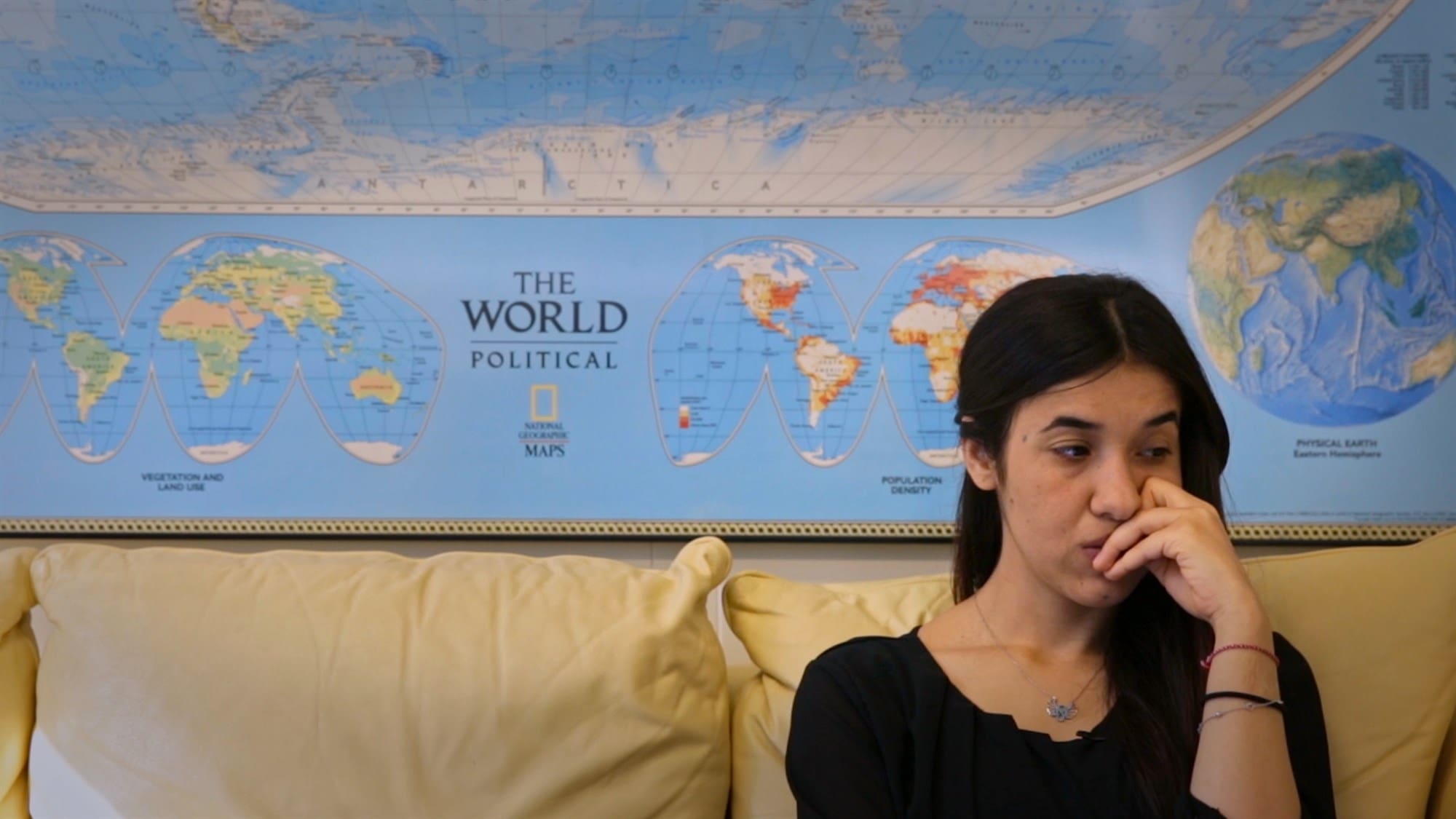If you’ve never heard of Nadia Murad Basee Taha, it’s not from her lack of trying. In December 2015, she testified in front of the UN about the religious genocide of the Northern Iraqi ethnic minority from which she came, the Yazidis, by Isis. After her testimony, Murad explains, “I thought they wouldn’t stand still after a victim spoke in front of them.” After a year of the #MeToo Movement, it’s hardly surprising that the tale of violence and sexual slavery she and the dozens of girls from her village experienced left the UN largely unmoved.
The same is not true of the film in which that interview appears. Rather, director Alexandria Bombach’s On Her Shoulders is a challenging, often devastating look at the way a victimized woman must rip herself open and present her trauma to the world to convince it to change.
Let’s not mince words: On Her Shoulders is a tough watch. The attacks that began on August 3, 2014 eventually claimed 18 of Murad’s family members and condemned her–as well as girls as young as 10, 12 and 15–to repeated beatings and sexual assaults by their captors. It’s perhaps no wonder that Murad often seems quiet, almost haunted—even if it’s also clear that there’s a storm constantly roiling beneath the surface. It’s also understandable, then, that after escaping, Murad couldn’t bear to stick with psychotherapy. It wasn’t because she didn’t want to keep reliving what happened to her, but because she couldn’t stop thinking about the girls left behind, who numbered 3,200 by the time Murad gave her second speech in front of the UN in 2016.
However, while Murad is no longer in therapy, that doesn’t mean she’s not constantly reliving her trauma. In scene after scene, we watch her answer the same interview questions over and over. Those interviewers listen and sometimes they cry, and then afterwards, when Murad is sometimes crying too, they insist that while re-telling her story isn’t easy, it’s important—as if she doesn’t know. In one interview, a woman asks, “how do you deal with all of it?” but rather than show us her answer, Bombach cuts to a close-up of Murad fiddling with a rubber band. It’s a striking choice, but one that Murad justifies later. “These kinds of questions are not the ones to ask,” she explains. Instead, she wants people to ask her not how she feels, but what can be done to help. Unfortunately, the most frustrating thing about Bombach’s film is how often she shows people asking the wrong questions.
One of the film’s most striking passages comes when Murad and fellow advocate, Murad Ismael, the executive director of Yazda, visit the Canadian House of Commons. They’re there to meet with a member of parliament, but when Murad first arrives, she has to ask Ismael to remind her why they’re there. The meeting is cordial, but it’s clear nothing concrete is achieved and perhaps that wouldn’t be so cringeworthy if the member of parliament didn’t then insist on giving Murad and Ismael a tour of the House of Commons. They gamely follow and take pictures, but the longer the scene goes on, the hollower and more meaningless the gesture seems.
That scene isn’t unique and the more time we spend with Murad, the more we wonder how she keeps going. Ismael, who remains Murad’s mostly-silent companion throughout expresses that sentiment in his own interview with Bombach. As he begins to cry, he says that while he sees Murad as the future voice of her people, he also worries she’s depleting her strength. As he reminds us, she’s awfully young (mid-20’s now and younger then) to take on this role and even through the course of the film, it’s difficult not to watch her goals slowly shift as the world moves on from the trauma that has defined so much of her life.
Given that, On Her Shoulders could have easily become a brutal slog, but Bombach is smart to give viewers an endpoint to work toward: starting with Nadia Murad’s first speech in front of the UN and following her in the ensuing months as she works to earn the right to speak in front of them again in 2016. We see her give one speech after another, her facility with English and her forensic skills improving each time. We see her visit fellow Yazidi refugees in Canada and Europe and we see her pick up a high-profile advocate, none other than Amal Clooney. And then, after her speech moves the UN to start an investigation into what happened in September 2017, we see her return to the skeletal remains of her village, barely able to stand from her grief, but also there not as a victim, but as the UN’s first Goodwill Ambassador for the Dignity of Survivors of Human Trafficking.
Hopeful as On Her Shoulders ultimately feels, it’s hard not to let what’s happening now dampen it. Everything we see happens before the 2016 election and it’s difficult not to think that, hard as Nadia Murad is still working to get justice, the Yazidis’ story is already being forgotten, lost to history as more horrors come to replace it. At one point, Nadia Murad says, “I’ll see myself as a person of worth when the terrorists are brought to justice.” It’s a harsh standard and one she may never meet, but either way, Bombach’s film already proves she’s a person of worth. The question is, are we worthy enough to listen?
Rating: 8.5/10
On Her Shoulders is now playing in select theaters


